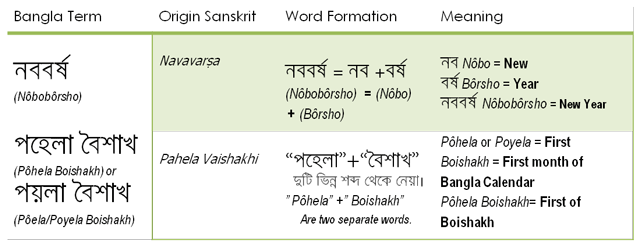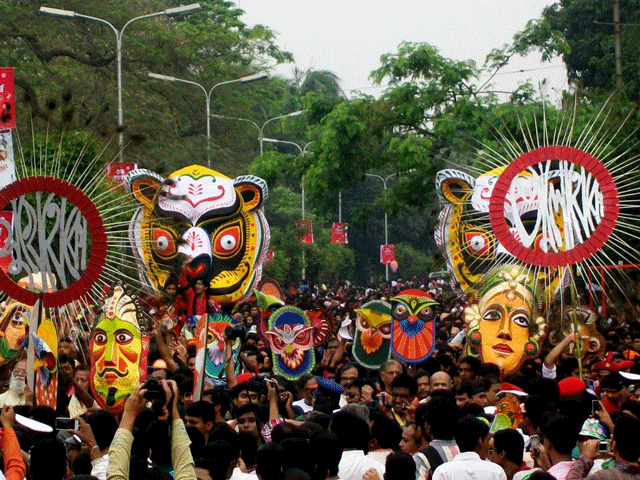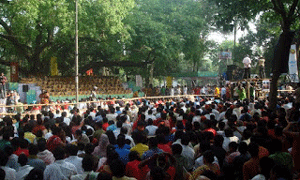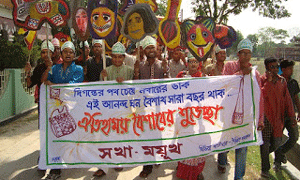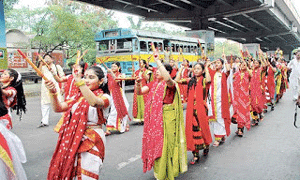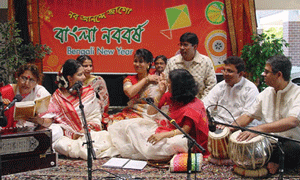 'চল্লিশ হাত মাটির নিচে পুঁতে ফেলব হারামজাদা পিপি। বড় পিপি হইছস। আমাদের লোকজন বাহিরে আছে। আমাদের সাজা হলে তোকে আমাদের লোকজন যেখানে পাবে সেখানেই হত্যা করবে। তোর প্রধানমন্ত্রী তোকে বাঁচাতে পারবে না।' গত ১৬ মার্চ রমনা বটমূলে বোমা হামলা মামলার যুক্তিতর্ক শুনানির এক পর্যায়ে মুফতি আবদুল হান্নান ঢাকার দ্বিতীয় অতিরিক্ত মহানগর দায়রা জজ আদালতের এজলাসে বিচারকের সামনেই অতিরিক্ত পাবলিক প্রসিকিউটর (পিপি) জাহিদ সরদারের কলার চেপে ধরে এ হুমকি দেন। ওই দিন বিকালে পিপি জাহিদ সরদার কোতোয়ালি থানায় একটি সাধারণ ডায়েরি (জিডি) করেন। জিডিতে তিনি নিরাপত্তা চেয়ে উল্লেখ করেন, যে কোনো সময় জঙ্গিরা তাকে হত্যা করতে পারে। তার পরিবারের সদস্যদেরও হত্যা করতে পারে। অথচ এখনও কোতোয়ালি থানা পুলিশ তাকে নিরাপত্তা দেয়নি।
'চল্লিশ হাত মাটির নিচে পুঁতে ফেলব হারামজাদা পিপি। বড় পিপি হইছস। আমাদের লোকজন বাহিরে আছে। আমাদের সাজা হলে তোকে আমাদের লোকজন যেখানে পাবে সেখানেই হত্যা করবে। তোর প্রধানমন্ত্রী তোকে বাঁচাতে পারবে না।' গত ১৬ মার্চ রমনা বটমূলে বোমা হামলা মামলার যুক্তিতর্ক শুনানির এক পর্যায়ে মুফতি আবদুল হান্নান ঢাকার দ্বিতীয় অতিরিক্ত মহানগর দায়রা জজ আদালতের এজলাসে বিচারকের সামনেই অতিরিক্ত পাবলিক প্রসিকিউটর (পিপি) জাহিদ সরদারের কলার চেপে ধরে এ হুমকি দেন। ওই দিন বিকালে পিপি জাহিদ সরদার কোতোয়ালি থানায় একটি সাধারণ ডায়েরি (জিডি) করেন। জিডিতে তিনি নিরাপত্তা চেয়ে উল্লেখ করেন, যে কোনো সময় জঙ্গিরা তাকে হত্যা করতে পারে। তার পরিবারের সদস্যদেরও হত্যা করতে পারে। অথচ এখনও কোতোয়ালি থানা পুলিশ তাকে নিরাপত্তা দেয়নি।এ প্রসঙ্গে পিপি জাহিদ সরদার গতকাল দৈনিক বর্তমানকে বলেন, 'বিচারকের সামনে আমাকে এ হত্যার হুমকি দেয় মুফতি হান্নান। আমি তাকে বলেছি, জীবন মৃত্যুর হাত আল্লাহর হাতে। আল্লাহ যেদিন মরণ রাখবে সেদিন মৃত্যু হবে। তবে রাষ্ট্রের কাছে নিরাপত্তা চাই। আমি মুফতি হান্নানকে বলেছি, তুমি আসলে মুফতি না। সত্যিকারের মুফতি কখনও কোনো দিন কাউকে হত্যার হুমকি দিতে পারে না।'
পিপি জাহিদ বলেন, 'রমনা বটমূলে বোমা হামলার মামলার কার্যক্রম আগামী ছয় মাসের মধ্যে শেষ হতে পারে। রাষ্ট্রপক্ষের যুক্তিতর্কের শুনানি শেষ হয়েছে। আসামি পক্ষেরও যুক্তিতর্কের শুনানি শেষ পর্যায়ে। কেবলমাত্র মামলার দুটি মানচিত্র পরিদর্শন কার্যক্রম শেষ হলেই মামলার কার্যক্রম শেষ হতে পারে। আগামী ২২ এপ্রিল মামলার শুনানির দিন ধার্য রয়েছে। এদিকে মামলার তদন্ত কর্মকর্তার ফের সাক্ষ্যগ্রহণের বিরোধিতা করে আসামিপক্ষ হাইকোর্টে রিট মামলা করেছে। আসামিপক্ষ ২২ এপ্রিল হাইকোর্টের আদেশ দাখিল করতে ব্যর্থ হলে মামলার প্রধান তদন্ত কর্মকর্তার সাক্ষ্যগ্রহণ ফের শুরু হবে।'
এদিকে মুফতি হান্নানের এই হুমকির পর গত ২৩ মার্চ নিজের নিরাপত্তার জন্য অস্ত্রের লাইসেন্স চেয়ে ঢাকার জেলা প্রশাসকের কাছে আবেদন করেন অতিরিক্ত পিপি জাহিদ সরদার। গতকাল পর্যন্ত এই আবেদনের কোনো অগ্রগতি হয়নি বলে জানান তিনি।
হাইকোর্টে আসামিপক্ষের রিট মামলা প্রসঙ্গে অ্যাটর্নি জেনারেল মাহবুবে আলম দৈনিক বর্তমানকে বলেন, 'যত দ্রুত সম্ভব হাইকোর্ট থেকে বিষয়টি নিষ্পত্তি করা হবে।' আসামি আকবর হোসেনের আইনজীবী জসীম উদ্দিন বর্তমানকে বলেন, 'মামলার যুক্তিতর্কের শুনানি শেষ পর্যায়ে। এ পর্যায়ে মামলার প্রধান তদন্ত কর্মকর্তার রিকলের সুযোগ দিলে আসামিপক্ষ ক্ষতিগ্রস্ত হবে। যে কারণে আমরা হাইকোর্টে গিয়েছি।
প্রসঙ্গত, গত ২৩ মার্চ রাষ্ট্রপক্ষ এক আবেদনে উল্লেখ করেন, মামলার গুরুত্বপূর্ণ দলিল 'বোমা হামলার পরিকল্পনা' শীর্ষক দুটি মানচিত্র আদালতে উপস্থাপন করা হয়নি। এ বিষয়ে মামলার প্রধান তদন্ত কর্মকর্তা সিআইডির পরিদর্শক আবু হেনা ইউসুফের জবানবন্দিও জেরা করা হয়নি। মামলার প্রমাণের স্বার্থে এ নথিটি উপস্থাপন করা জরুরি।
রাষ্ট্রপক্ষের আইনজীবী জাহিদ সরদার বলেন, গত ৮ এপ্রিল সকালে ঢাকার দ্বিতীয় অতিরিক্ত জেলা ও দায়রা জজ আদালতের বিচারক মো. রুহুল আমিনের বদলির আদেশ হয়। এ খবর পেয়ে আমি সেদিন পদত্যাগ করার সিদ্ধান্ত নিয়েছিলাম। আবারও অদৃশ্য কারণে ওইদিন বিকালে আরেক আদেশে পূর্বের বদলি আদেশ স্থগিত করা হয়। আওয়ামী লীগ সরকার ক্ষমতায় থাকার পরও কোন অদৃশ্যহাত মামলার বিচারকাজ বিলম্বিত করার চেষ্টা করছে তা খতিয়ে দেখারও দাবি জানান তিনি'
জাহিদ সরদার আরও বলেন, এর আগেও আসামিপক্ষ নানান কারণ দেখিয়ে মামলার বিচারকে বিলম্বিত করার চেষ্টা করেছে। তারা নানা অজুহাতে ১০ বার হাইকোর্টে গেছে। যুক্তিতর্কের নামে অহেতুক তাদের আইনজীবীরা আদালতকে বিভ্রান্তমূলক তথ্য দিয়েছে। এছাড়া গত ছয় বছরের মধ্যে দেড় বছর কোনো বিচারক ছিলেন না ওই আদালতে। বোমা হামলার পর বিগত বিএনপি- জামায়াত জোট সরকার তদন্তের নামে পরপর ছয়জন তদন্ত কর্মকর্তা নিয়োগ দিয়েছিল। এরপরও তদন্ত শেষ হয়নি তদন্ত কার্যক্রম। ওয়ান ইলেভেনের সরকারের শেষ সময় আদালতে অভিযোগপত্র দাখিল করে সিআইডি জাহিদ আরও বলেন, আসামিরা আমাকে একাধিকার প্রাণে মেরে ফেলার হুমকি দিয়েছে। ঘুষের বিনিময়ে মৃত্যুদণ্ডের বদলে যাবজ্জীবন কারাদণ্ড চাইতে বলেছিলেন তারা। ওরা ২০ কোটি টাকার ঘুষের অফার দিয়েছিল। আমি গ্রহণ করিনি। এমনকি আদালতের মধ্যে আসামি মুফতি হান্নান আমার কলার চেপে ধরে হত্যার হুমকি দেয়। রাষ্ট্রের কাছে নিরাপত্তা চেয়েও পাইনি। অথচ বিডিআর মামলা পরিচালনাকারী আইনজীবীরা নিরাপত্তায় পুলিশ কনস্টেবল পেয়েছে। আমি কেন পাইনি তা জানি না।'
মামলার তদন্ত কর্মকর্তা আবু হেনা ইউসুফ তার জবানবন্দিতে উল্লেখ করেন, '২০০১ সালের ১৪ এপ্রিল রমনা বটমূলের ছায়ানটের বর্ষবরণ অনুষ্ঠানের মূল মঞ্চ নির্মাণে যেসব শ্রমিক ছিলেন তাদের পরিচয় উদ্ধার করতে পারিনি। বোমা হামলার সঙ্গে হুজি নেতা মুফতি আব্দুল হা্ন্নান ও আরিফ হাসান সুমন জড়িত ছিলো।'
মামলার নথিপত্র সূত্রে জানা যায়, মাওলানা আকবর হোসেন ওরফে হেলাল উদ্দিন ২০০৬ সালের ১৪ জুন আদালতের কাছে স্বীকারোক্তিমূলক জবানবন্দি দেন। আকবর আদালতকে বলেন,' আমি মাদানীনগর দারুল উলুম মাদ্রাসার ভাইস প্রিন্সিপাল ছিলাম। রমনা বটমূলে ঘটনার ৮/১০ দিন পূর্বে মোহাম্মদপুর রহমানিয়া আরাবিয়া মাদ্রাসার সাত গম্বুজ মসজিদের সামনে এশার নামাযের পর আমি, মাওলানা শওকত ওসমান ওরফে শেখ ফরিদ, মুফতি আব্দুল হাই, মাওলানা আব্দুল হান্নান, মওলানা রউফ, আব্দুল জব্বারসহ পাঁচ-ছয়জন যাদের নাম জানি না। এক সভা করি। সভায় সিদ্ধান্ত নেয়া হয়, ১ বৈশাখ রমনা বটমূলে বোমা হামলা করা হবে।'
অপরদিকে ২০০৬ সালের ১৯ নভেম্বর মামলার প্রধান আসামি মুফতি আবদুল হান্নান আদালতে স্বীকারোক্তিমূলক জবানবন্দিতে বলেন, 'ঢাকা মহানগরীর দায়িত্বে নিয়োজিত হুজির রণাঙ্গনের শিল্পী গোষ্ঠীর হাফেজ আবু তাহের, ঢাকার মাওলানা শেখ ফরিদ ১ বৈশাখে রমনা বটমূলে গানের অনুষ্ঠান চালানো বন্ধ করার জন্য বোমা বিস্ফোরণ ঘটানোর প্রস্তাব দেয়। শেখ ফরিদ, মোহাম্মদপুর শিয়া মসজিদ ও রহমানিয়া মাদ্রাসার মাঝামাঝি স্থানে মহানগর অফিসে আসে। মাওলানা রউফ ইয়াহিয়া, সাব্বির, জাহাঙ্গীর বদর, আবু তাহের ও আরো কয়েকজনের উপস্থিতিতে শেখ ফরিদের মাধ্যমে তাদেরকে ১ বৈশাখে বটমূলে গানের অনুষ্ঠানে বোমা বিস্ফোরণের জন্য ফের প্রস্তাব দেয়। বিষয়টির ওপর আলোচনা করে সিদ্ধান্ত নেয়া হয়, দলের আমির মুফতি শফিকুর রহমানের অনুমতি ব্যতীত কিছুই করা ঠিক হবে না। যা করতে হয় তার অনুমতি লাগবে। পরে আমির সাহেব অনুমতি দেন। দায়িত্ব দেন সাব্বির, বদর, তাহের, হাসান, ওমর ফারুক ও আরো কয়েকজনকে নিয়ে রমনা বটমূলে বোমা হামলা চালানোর।
অপরদিকে মামলার গুরুত্বপূর্ণ আসামি আরিফ হাসান সুমন বিচারকের কাছে স্বীকারোক্তিমূলক জবানবন্দি দেন। সুমন আদালতকে বলেন, ' ২০০১ সালের ১ বৈশাখের আগের দিন মাওলানা তাজউদ্দিন আমাকে তার বাসায় ডেকে বোমা তুলে দেন। জনি, জুয়েল, সুজনসহ আমি বোমা সেট করে আসি। পরে সেখানে বোমা বিস্ফোরিত হয়। তাজউদ্দিন ওই ঘটনা কাউকে বলতে নিষেধ করেন। আমি কাউকে কিছুই বলিনি।
মামলার অন্যতম সাক্ষী বিস্ফোরক বিশেষজ্ঞ মো. শামসুল আলম আদালতকে বলেন, 'মামলার আলামত বিস্ফোরিত পাইপের অংশ, চিকন তার ও ছিন্ন ভিন্ন কাপড়ের টুকরা পরীক্ষা করে দেখা যায়, বিস্ফোরিত বোমাটি অ্যামোনিয়াম নাইট্রেট সংবলিত ডিনামাইট ছিল।'
রাষ্ট্রপক্ষ থেকে আদালতের কাছে আবেদন করা হয়, মামলার বাদীর এজহার, ৬১ জনের সাক্ষ্য, আসামিদের স্বীকারোক্তিমূলক জবানবন্দি ও অভিযোগপত্র সমর্থন করে যে, প্রত্যেক আসামির বিরুদ্ধে সুনির্দিষ্ট অভিযোগ প্রমাণিত হয়েছে। যে কারণে আসামিদের সর্বোচ্চ শাস্তি মৃত্যুদণ্ড দেয়া হোক।
২০০১ সালের ১৪ এপ্রিল এ ঘটনায় ১০ জন নিহত হন। আহত হন আরো অনেকে। ওই দিনই রমনা থানায় নীলক্ষেত পুলিশ ফাঁড়ির সার্জেন্ট অমল চন্দ্র চন্দ হত্যা ও বিস্ফোরক আইনে মামলা করেন।
মামলার এজহারে বলা হয়, রমনা পার্কের রমনা বটমূলে ছায়ানটের বর্ষবরণ সাংস্কৃতিক অনুষ্ঠান চলাকালে আসামিরা পরস্পর যোগসাজশে পূর্ব পরিকল্পিতভাবে সকাল ৮টার দিকে বোমা বিস্ফোরণ ঘটায়। বোমা বিস্ফোরিত হয়ে ১০ জন লোক নিহত হয়। আহত হন ২০ থেকে ২৫ জন। নিহত ব্যক্তিরা হলেন, অসীম চন্দ সরকার, আবুল কালাম আজাদ, জসিম, একরাম, মামুন, রিয়াজ, ইসমাইল হোসেন, আফসার ও অজ্ঞাত আরও দুইজন।
সাতজন তদন্ত কর্মকর্তার হাত ঘুরে ঘুরে ২০০৮ সালের ২৯ নভেম্বর পুলিশের অপরাধ তদন্ত বিভাগের (সিআইডি) পরিদর্শক আবু হেনা মো. ইউসুফ ১৪ জনকে আসামি করে হত্যা ও বিস্ফোরক আইনে আলাদা দুটি অভিযোগপত্র দাখিল করেন।
মামলার ১৪ আসামির মধ্যে আরিফ হাসান সুমন, শাহাদত উল্লাহ ওরফে জুয়েল, হাফেজ মাওলানা আবু তাহের, মাওলানা আব্দুর রউফ, মাওলানা সাব্বির ওরফে মুফতি আব্দুল হান্নান সাব্বির, মাওলানা শওকত ওসমান ওরফে শেখ ফরিদ, হাফেজ মাওলানা ইয়াহিয়া ও মাওলানা আকবর হোসাইন ওরফে হেলালউদ্দিন কারাগারে আছেন।
আর পলাতক আছেন আলহাজ মাওলানা মোহাম্মদ তাজউদ্দিন, হাফেজ জাহাঙ্গীর আলম বদর, মাওলানা আবু বকর ওরফে হাফেজ সেলিম হাওলাদার, মুফতি শফিকুর রহমান, ও মুফতি আব্দুল হাই। আদালত মামলাটিতে ২০০৯ সালের ১৬ এপ্রিল ১৪ আসামির বিরুদ্ধে অভিযোগ গঠন করেন।

রমনা বটমূলে বোমা হামলা ট্রাজেডি : এক যুগেও শেষ হয়নি বিচার ...
রমনা বটমূল বোমা হামলা নিজেই যুক্তিতর্ক শুনানি করলেন মুফতি ...
রাষ্ট্রপক্ষের ভুলে পেছাল রমনায় বোমা হামলা মামলার বিচার - logo
__._,_.___
